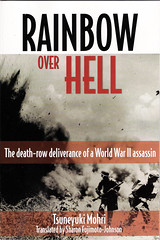Welcome!
Welcome to the official blog of Rainbow Over Hell.
For those of you who may not know, Rainbow Over Hell tells the true story of Saburo Arakaki's transformation from World War II assassin to preacher for God. Several years have passed since I first began working on translating this incredible book by award-winning Japanese author, Tsuneyuki Mohri, and I'm happy to announce that Rainbow Over Hell is now available for the first time in English. Pacific Press published Rainbow Over Hell in early March 2006, and it is slowly finding its way into bookstores across the U.S. (Ordering information can be found here.)
In this blog, we will report on news and promotional events related to the book. We also hope to hear back from readers. The original Japanese edition of the book (地獄の虹)resulted in a series of incredible stories that unfolded in the lives of readers, and we hope that the English edition will be no different. We welcome your stories and comments on this blog and through email.



1 Comments:
Congratulations on an excellent translation of a moving story! I was looking forward very much to reading this first English translation of a book by Tsuneyuki Mohri. Previously, I had watched Gekko no Natsu (Summer of the Moonlight Sonata), a 1993 Japanese movie he wrote about two kamikaze pilots. This movie treats with great sensitivity the wartime experiences of kamikaze pilots and the postwar experiences of surviving pilots. I also previously read two Japanese books by Mohri-san about kamikaze pilots. The book Rainbow Over Hell has the same intense human emotion, thorough research, and engaging narrative as the other two books.
Saburo Arakaki experienced one incredible event after another during his life. As just one example, I never imagined before that any Japanese civilian on Saipan evaded capture for over a year from the time American forces landed in June 1944 until after the end of the war. Viewed from today's comfortable world, it's hard to believe the deprivation, fighting, torture, and isolation that Arakaki-san faced as a young man.
Two things in the book really touched me. First, Arakaki-san demonstrated by his actions real love for others. He carried the wounded sergeant on his back for three days, took care of him as they hid in a cave, and finally tried to swim to a safer place while pulling him through the water. This extraordinary commitment to care for a helpless person he never knew before serves as a standard we can all strive for in our own relations with others.
The second touching incident for me was Arakaki-san's complete forgiveness of the person he had trusted so much but who betrayed him with the result being a death sentence. I found it heartwarming that Arakaki-san and his betrayer Jojima-san remained friends even after everything they went through. If people could somehow forgive each other in the same way as Arakaki-san did when he met Jojima-san again, then surely this world would have far less conflicts than today.
With Rainbow Over Hell being a story of religious conversion, I am glad that a non-believer wrote the story since I think it has more impact and objectivity. The book's message of love and forgiveness is relevant to believers of any faith and also to non-believers.
Mohri-san has a unique style that I enjoy very much. He is very thorough in his research, and he also immerses himself personally in the story. The idea of retracing Arakaki-san's journey is a great one, since he had many important incidents of his life in the far-flung places of Saipan, Guam, Hawaii, mainland Japan, and Okinawa. Usually I would think that a book written ten years after the related film documentary would be quite boring, but Mohri-san has a gift to make the story come alive.
The book reads very naturally in English, and it must have been quite a challenge to determine some of the obscure place names in English that are contained in the book. I would have liked some maps, especially of Saipan, to make it easier to follow where Arakaki-san was going both during the war and during his 1987 journey.
I hope that you have much success with this book and that many people will have the opportunity to read this remarkable story of love and forgiveness.
Post a Comment
<< Home